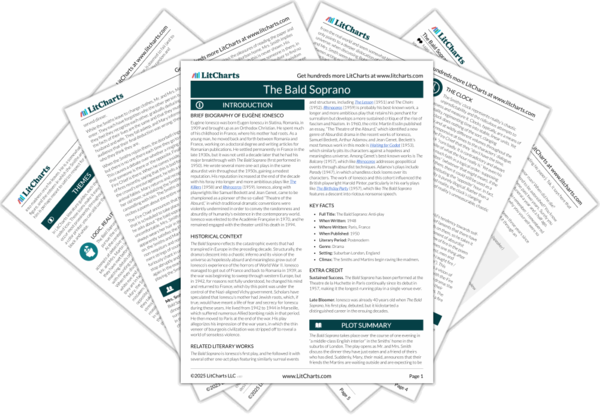The reckless tolling of the Smiths’ clock punctuates the action of The Bald Soprano, imposing a constant awareness of time on both the audience and the play’s characters. Yet something is clearly amiss from the first moment of the play, when the clock tolls 17 times and Mrs. Smith says, “There, it’s nine o’clock,” a statement that wouldn’t even make sense if the clock were keeping 24-hour military time (which chiming clocks pretty much never do anyway). Later, the Fire Chief says that he must get across town to put out a fire in “exactly three-quarters of an hour and sixteen minutes.” The characters’ terms for measuring time thus differ from the real world and seem somewhat bizarre. Yet this oddity only points to a deeper dislocation of time in the play’s universe: when discussing Bobby Watson’s death, Mr. Smith and Mrs. Smith seem to move seamlessly back and forth between acting out their reactions at the time of his death and looking back on the incident in hindsight—in the space of a few lines, Mr. Smith says the death occurred, two, then three, then four years ago. Mr. Smith later tells the Fire Chief that they “don’t have the time, here, [because the clock] runs badly. It is contradictory and always indicates the opposite of what the hour really is.” The play’s world, it seems, is submerged in temporal chaos, with the characters detached from any linear path through their lives. Yet the notion of the time being “contradictory” comes to the fore at the very ending of the play: that ending, it turns out, is also a rebeginning; the play starts up again exactly as before, but with the Martins and Smiths switching places. In this final dramatic gesture, Ionesco takes an even darker view of time than he had previously seemed to: rather than inhabiting a chaotic and non-linear temporal flux, the characters seem to be trapped in an inescapable cycle of repetition. In this way, Ionesco seems to comment on the mundanity of daily life and the way it repeats itself over and over with small, meaningless variations.
Time ThemeTracker

Time Quotes in The Bald Soprano
MRS. SMITH: There, it’s nine o’clock. We’ve drunk the soup, and eaten the fish and chips, and the English salad. The children have drunk English water. We’ve eaten well this evening. That’s because we live in the suburbs of London and because our name is Smith.
MR. SMITH [still reading his paper]: Tsk, it says here that Bobby Watson died.
MRS. SMITH: My God, the poor man! When did he die?
MR. SMITH: Why do you pretend to be astonished? You know very well that he's been dead these past two years. Surely you remember that we attended his funeral a year and a half ago.
MRS. SMITH: Oh yes, of course I do remember. I remembered it right away, but I don't understand why you yourself were so surprised to see it in the paper.
MR. SMITH: It wasn't in the paper. It's been three years since his death was announced. I remembered it through an association of ideas.
MRS. SMITH: We don't have the time, here.
FIRE CHIEF: But the clock?
MR. SMITH: It runs badly. It is contradictory, and always indicates the opposite of what the hour really is.
[The words cease abruptly. Again, the lights come on. Mr. and Mrs. Martin are seated like the Smiths at the beginning of the play. The play begins again with the Martins who say exactly the same lines as the Smiths in the first scene, while the curtain softly falls.]











